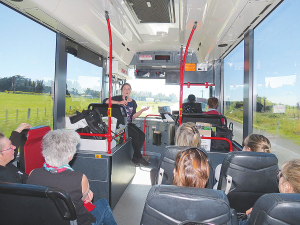Sound familiar?
OPINION: The Hound notes that a new study, carried out by CQUniversity in Queensland, has found similar issues to NZ with a real lack of agricultural knowledge among young Aussies.
 The study identified a lack of agricultural knowledge among school students and suggests exposing students to agricultural workplaces and to people who work in the sector as a way of rectifying this.
The study identified a lack of agricultural knowledge among school students and suggests exposing students to agricultural workplaces and to people who work in the sector as a way of rectifying this.
A new study in Australia has identified a lack of agricultural knowledge among school students, highlighting a need for better agricultural education programs.
In the largest ever study of its kind CQUniversity's Agri-tech Education and Extension research team, led by Dr Amy Cosby, surveyed more than 5,000 primary and secondary students across Australia about their knowledge of agriculture.
The study found many students thought of agriculture as a low-tech industry; four in five primary students and three in five secondary students believe commercial milking of cows occurs by hand rather than machine. Awareness of agricultural careers was also limited with many only able to recognise traditional job roles such as 'farmer' and 'beekeeper'.
Importantly, the study showed one of the key factors impacting students' agricultural knowledge was their level of exposure to farms, with students who live on a farm or who visited a farm at least four times a year scoring significantly higher than those who had never been to a farm.
Cosby said this highlights the importance of including regular exposure to farming activities in agricultural programs for Australian schools.
"If students are not being show an accurate vision of modern agriculture they are unlikely to recognise that agricultural jobs can be highly skilled, well paid and possibly located outside rural areas."
She adds that although agriculture is in a period of rapid technological advancement modern farming practices are not being adequately portrayed to students, calling this a likely contributing factor to the industry's current skilled workforce shortage.
Except for New South Wales' Year 7-8 curriculum, agriculture as a subject is not a mandatory inclusion in most Australian schools.
Most surveyed students could recognise that some fruits and vegetables grow better in certain parts of the world and just over half of secondary students understood that hormones are not given to chickens to make them grow (a practice banned in Australia since the 1960s).
Cosby says the study highlights the need for a formal framework to assess students' agricultural literacy similar to the United States National Agricultural Literacy Outcomes (NALOs), calling the absence of an Australian agriculture literacy framework a "significant deficit" limiting agricultural education.
"Today's students are tomorrow's consumers and their future purchasing decisions will be shaped by their understanding of thngs like animal welfare, environmental sustainability and healthy eating practices," she explains. "Nothing beats exposing students to agricultural workplaces in real life and to peple who work in these careers."
Global trade has been thrown into another bout of uncertainty following the overnight ruling by US Supreme Court, striking down President Donald Trump's decision to impose additional tariffs on trading partners.
Controls on the movement of fruit and vegetables in the Auckland suburb of Mt Roskill have been lifted.
Fonterra farmer shareholders and unit holders are in line for another payment in April.
Farmers are being encouraged to take a closer look at the refrigerants running inside their on-farm systems, as international and domestic pressure continues to build on high global warming potential (GWP) 400-series refrigerants.
As expected, Fonterra has lifted its 2025-26 forecast farmgate milk price mid-point to $9.50/kgMS.
Bovonic says a return on investment study has found its automated mastitis detection technology, QuadSense, is delivering financial, labour, and animal-health benefits on New Zealand dairy farms worth an estimated $29,547 per season.

OPINION: Here w go: the election date is set for November 7 and the politicians are out of the gate…
OPINION: ECan data was released a few days ago showing Canterbury farmers have made “giant strides on environmental performance”.